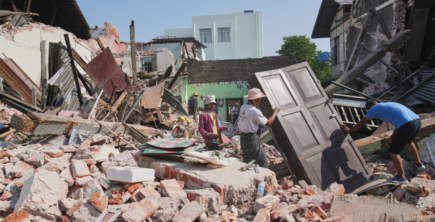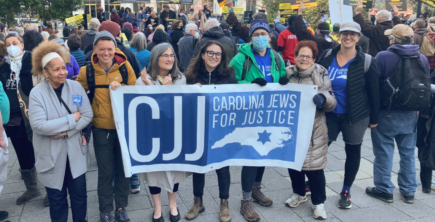
Healthy Individuals & Communities


The message was clear: Frontline social change leaders who are doing the work on the ground must possess the power and agency to do what’s necessary for their communities. Whether it’s in the realm of climate justice, protection of democracy, or racial justice writ large, the emphasis on building strong relationships and trusting proximate leaders to best serve their communities was the predominant theme at the Tides event Get Off Your Assets: Funding the Frontlines, which took place earlier this month.
“Too many progressives fall into the trap [that] this is like an investment,” said Tides founder Drummond Pike during the opening dialogue with Tides CEO Janiece Evans-Page and john a. powell, director of the Othering & Belonging Institute, at the recent online event that brought together organizational leaders and philanthropic partners.
Funders may believe that, “we need accountability, we need measurements, we need quantification,” Pike noted. “In truth, what really works in the progressive sector — and, in my view, in all grantmaking — is when you trust your grantees.”
An unnecessary binary sometimes transpires, powell said, between donors and grantees.
“One is to micromanage: How many pencils are you buying? We want accountability,” powell said. “The other is, give them the money and go away. And I think both are somewhat understandable, but limited. A relationship is nothing different than saying, ‘What are we donors doing right about what’s happening in the world?’ [And grantees saying] ‘And this is what we’re seeing as we do our work, and we’d like to actually talk to you about it.’ It’s not just money [trading hands].”
“Part of the thing that Tides has done over the years would be to convene people to play thought leaders. That was extremely important,” powell said. “Sometimes it’s actually lifting up a voice. So you bring more resources than just money. You bring your knowledge, your connections, and you can be in a relationship.”
On the subject of allyship, powell took the concept one step further.
“I’m not a categorical supporter of allies. You don’t really want allies in the deep sense. You want partners,” he said. “You want people who are committed. You want people who have skin in the game who see that they’re not just trying to help Black people or Latin X people or Asian people. It’s like all people — they have skin in the game. When you come from that framework, it doesn’t mean that you don’t have groups who are closer to a problem having a weighted role, but not an exclusive role — because they’re in a relationship. And the relationship piece, from my perspective, is oftentimes lost.”
Watch the full video of the rich conversation here.
The GOYA event included three breakout sessions, presented by BIPOC leaders in the field, inviting funders to participate in the conversations. These were just a few of the important takeaways.
Speaker: Jason McGill, founder & principal at Justice Associates
On shifting power to impacted communities:
“Structural racism lives in the data, and the data show us that where we are today is, unfortunately, writ large, not remarkably different from where we were 50 years ago, or 100 years ago. There is so much wisdom and experience in communities of color, and in other communities of folks who have been deeply marginalized in society. There is a need at a justice level to move those resources to those folks to ensure that all of the voices of those who are marginalized — and ultimately those who are deeply impacted by all of the systems of anti-democratic practice of anti-environmentalism, and are oftentimes the most deeply impacted by those systems — that they have an opportunity to contribute their leadership and wisdom to advancing change for all of us.”
On scarcity versus abundance:
“At the end of the day, if all you’re thinking about is money, you’re thinking about a project of scarcity. If you’re thinking about relationships, you’re thinking about a project of abundance. If you lead with the money, you’re leading with scarcity, and you have to stop doing that. Funding communities of color is to think about it from abundance rather than scarcity.”
“Money is both toxic and intoxicating. And the toxicity of it is that it’s a scarcity, because we’re worried we’re not going to have enough. If instead you think about relationships, and you think about curiosity, and words like humility, integrity, authenticity — those things are abundances. You can have as much of that as you want, and there’s more to get. If you start work that way, then the money starts to become one of the tools you’re using. It’s not the only thing you have. And now you’re thinking about the trust that you feel towards the people you’re getting to know.”
On how philanthropy needs to change:
“Philanthropy is an ‘othering’ practice — wanting to have an impact; wanting to ‘lead’ and ‘support’ leadership. This language is distant from the language of curiosity. That language is rooted away from humility and of building genuine relationships. [As a funder], how then do I position myself to recognize my own emotional reactions to this type of work — when I’m feeling resistant or judging or limited, and how do we move away from the experience of polarization?”
Speakers: Jacqueline Patterson, Founder and Executive Director of the Chisholm Legacy Project and Katherine Egland, Environmental and Climate Justice Committee chair, NAACP
On staying resilient:
“We were told we should stick with civil rights because that’s what we did best. The fossil fuel company sent some of their representatives to warn us not to listen to these environmental groups because they were a bunch of rich white people who didn’t care anything about black people in jobs. They just cared about birds and trees. But we’ve also been very successful in getting some of the rules and statutes changed with the Mississippi Department of Environmental Quality. We challenged the Southern Company and Mississippi Power Company, and again, we won.” — Katherine Egland
On the power of individuals fueling movements:
“Success, for us, it looks like everyone knows their place in the movement. Everyone knows whether they’re starting a conversation at dinner, they’re holding a film screening in a church, they’re starting a micro-grid or a local food movement, or they’re blocking a pipeline, or whatever it is that everyone has a pathway to be involved in this movement, to save our planet and save our communities. So we really are about scaling. We’re about making sure that everyone knows what those pathways are, what the resources are for them to get involved. And in five years, I don’t want anyone to say that they don’t know what they can do to be a part of the climate justice movement.” — Jacqueline Patterson
On trusting the community:
“Funders can be more responsive to our needs and listen to us, and trust that we best understand our needs and best know how to address them. We only lack funding to implement the work. We might not be tech geniuses, but we are certainly experts when it comes to our community. We’ve been able to do so much with so little. And I’ve noticed that even when we get very little funding to do our work, we have so much pressure as it relates to reporting. You can fulfill and go above and beyond everything that you said you would do in your action plan, but then you’re still required to attend these meetings. We’re fighting all of these battles and then trying to get all of our people connected and on board.” — Katherine Egland
Speakers: Marisa Franco, director, Not1More Deportation Campaign & Mijente and Ian Bassin, founder and executive director of Protect Democracy.
On building an ecosystem of power:
“People don’t have access to the same information. People are structurally marginalized. And so when communities are marginalized, when government is not really talking to them, when political parties aren’t really talking to them, and it’s not a priority to talk to them, and there’s not an infrastructure, there’s very little community organizing infrastructure in the Latino community. So it’s slow. And we view part of our work to build an ecosystem. If there’s a place where there’s a gap, we need to build a stronger organization. The more that we are disconnected, the more that people are marginalized, the less we’re going to be able to actually activate.” — Marisa Franco
On providing support that’s necessary and appropriate:
“Instead of legal and policy groups helicoptering into a community with a top-down approach, we instead did a landscape analysis of frontline groups in the fight for democracy and asked a bunch of questions… [We need to make] sure that we are not just providing the security we need for the people doing this work, but understanding psychologically and emotionally the change that represents in terms of what it means to do this work and making sure that we’re supporting that and resourcing that appropriately.” — Ian Bassin
On keeping eyes on the prize:
“We don’t want to be loyal to a particular strategy or a particular tactic. We want to be loyal to what we’re trying to accomplish together. And so we’ve learned those lessons and have been helping local groups do that because more and more groups are trying to build out the ability to use different strategies, including working with educating and mobilizing voters.” — Marisa Franco

Healthy Individuals & Communities

Our Community

Philanthropy

Read the stories and hear the voices of social change leaders fighting for justice.